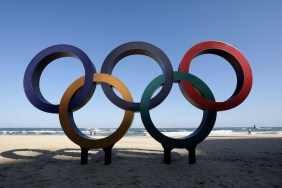Squeezed in between lamentations and punchlines about the dystopian setting Rio has proven to be for this year’s Summer Olympics are slight nods of concern for athletes who have spent years (if not lifetimes) preparing for what may be their last or only shot at glory. The reward for all their hard work – before they ever even dive, run, or box – is being forced to decide if the possibility of contracting the Zika virus is worth it, if rowing through oil and shit-filled water is worth it, and if shoddy site construction and uncertain safety precautions are worth it.
An unintended payoff to Morgan Neville’s short documentary A Fighting Chance is how it fleshes out just how horrible the Rio fiasco is simply by focusing on the stories of four athletes from impoverished backgrounds who have committed everything to trying to score a slot at the Olympics. Their stories, which are simultaneously gut-wrenching and inspiring, also make you see red at how the corruption and incompetence in play this year shows the Olympic organization to be utterly cavalier about the athletes it supposedly serves.

Tsepo Mathibelle
Neville, who directed the Academy Award-winning documentary 20 Feet from Stardom, turns his cameras on Tsepo Mathibelle (a marathon runner from Lesotho, South Africa), Miller Pata and Linline Matauatu (beach volleyball players from Vanuatu), and Yenebier Guillén Benitez (a boxer from the Dominican Republic), and quickly, deftly sketches in their specific familial history and cultural frames as the backdrops for their dreams. Poverty is the tie that binds all the athletes as they train tirelessly, even they’re dog tired; as they struggle with constricting gender roles, ailing parents, children who need them, and entire villages or countries pinning collective hopes on their backs. One speaker says very early in the film, “The [potential] payoff is not only for the individual but for their family and community.”

Miller Pata & Linline Matauatu
There’s enough hardship depicted in the film to put a permanent lump in your throat – a deadly cyclone that hits Vanuatu and destroys family homes; an injury that derails what should have been a triumph; failure to score the crucial victory to secure an Olympic spot – and Neville captures it all without shamelessly milking hard luck stories in the way that TV shows live “American Idol” and the like do. He avoids crass manipulation and lets the fullness of the individual narratives do the work. In a typical Hollywood film, every one of these subjects would be on their way to Rio and then nab the gold. They’ve clearly put in a superhuman effort; they’re earned it. But this isn’t Hollywood fiction, so instead, the viewer is reminded of the painful vagaries and inherent cruelties of life. There is a happy ending, but it’s in the context of crushing defeats. That’s what gives the film both its emotional punch and its veracity.

Tsepo Mathibelle
The one weakness in the film is also its strength. It’s absolutely breathtaking to look at. But that means at times it veers into looking like a travelogue ad. An overhead shot of a herd of animals running across a South African plain is as visually gorgeous as footage of a woman walking through her village post-cyclone. The effort to show the humanity of the film’s subjects and their communities, to celebrate the resilience of the human spirit manifests in an aesthetic choice that, in some ways, actually undercuts the power of the stories being told. That’s a real flaw, but not one that invalidates the film.







